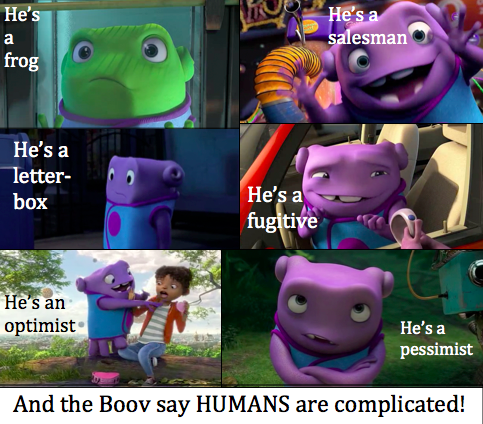River Needham, MA ThM queeries the Tanakh reading.
Tanakh: Job 1:1, 2:1-10
There was a man in the land of Uz named Job. That man was blameless and upright; he feared God and shunned evil.
[...]
One day the divine beings presented themselves before the Becoming One. The Adversary came along with them to present himself before the Becoming One. The Becoming One said to the Adversary, “Where have you been?”
The Adversary answered the Becoming One, “I have been roaming all over the earth.”
The Becoming One said to the Adversary, “Have you noticed My servant Job? There is no one like him on earth, a blameless and upright man who fears God and shuns evil. He still keeps his integrity; so you have incited me against him to destroy him for no good reason.”
The Adversary answered the Becomig One, "Skin for skin—all that a human man has he will give up for his life. But lay a hand on his bones and his flesh, and he will surely blaspheme You to Your face.”
So the Becoming One said to the Adversary, “See, Job is in your power; only spare his life.”
The Adversary departed from the presence of the Becomig One and inflicted a severe inflammation on Job from the sole of his foot to the crown of his head. He took a potsherd to scratch himself as he sat in ashes.
His wife said to him, “You still keep your integrity! Blaspheme God and die!”
But he said to her, “You talk as any shameless woman might talk! Should we accept only good from God and not accept evil?” For all that, Job said nothing sinful.
Queeries for the text:
What is missing from the text?
How is theodicy apparent?
What does shameless mean?
Where else is shameless used in the Tanakh?
How is shameless a good thing?
How is this text problematic?
-----
Rev. Emily E. Ewing queeries the Gospel reading.
Gospel: Mark 10:2-16
2Some religious authorities came, and to test Jesus they asked, “Is it lawful for a man to divorce his wife?”
3Jesus answered them, “What did Moses command you?”
4They said, “Moses allowed a human man to write a certificate of dismissal and to divorce her.”
5But Jesus said to them, “Because of your hardness of heart Moses wrote this commandment for you.
6But from the beginning of creation, ‘God made humanity with many and no genders.’
7‘For this reason a person shall leave their parents and be joined to their spouse,
8and they shall become one flesh.’ So they are no longer distinct persons, but one flesh.
9Therefore what God has joined together, let no one separate.”
10Then in the house the disciples asked Jesus again about this matter.
11He said to them, “Whichever husband divorces his wife and marries another commits adultery against her;
12and if a woman divorces her husband and marries another, she commits adultery.”
13People were bringing little children to Jesus in order that he might touch them; and the disciples spoke sternly to them.
14But when Jesus saw this, he was
indignant and said to them, “Let the little children come to me; do not
stop them; for it is to such as these that the reign of God belongs.
15Truly I tell you, whoever does not receive the reign of God like a little child will never enter it.”
16And Jesus took them up in his arms, laid his hands on them, and blessed them.
Queeries for the text:
Where were they?
Why do we test Jesus?
What's the difference between what is lawful and what is right?
Where is the power?
What happens with divorce?
What counts as adultery? What doesn't?
How do children receive the reign of God?
How have children been discarded?
What are your queeries?
Tuesday, September 28, 2021
Thursday, September 23, 2021
Queerying 18th after Pentecost B
 River Needham, MA ThM queeries the Tanakh reading.
River Needham, MA ThM queeries the Tanakh reading.Tanakh: Esther 7:1-6, 9-10; 9:20-22
So the king and Haman came to feast with Queen Esther.
On the second day, the king again asked Esther at the wine feast, “What is your wish, Queen Esther? It shall be granted you. And what is your request? Even to half the kingdom, it shall be fulfilled.”
Queen Esther replied: “If Your Majesty will do me the favor, and if it pleases Your Majesty, let my life be granted me as my wish, and my people as my request. For we have been sold, my people and I, to be destroyed, massacred, and exterminated. Had we only been sold as bondspeople, I would have kept silent; for the adversary is not worthy of the king’s trouble.”
Thereupon King Ahasuerus demanded of Queen Esther, “Who is he and where is he who dared to do this?”
“The adversary and enemy,” replied Esther, “is this evil Haman!” And Haman cringed in terror before the king and the queen.
[...]
Then Harbonah, one of the eunuchs in attendance on the king, said, “What is more, a stake is standing at Haman’s house, fifty cubits high, which Haman made for Mordecai—the man whose words saved the king.” “Impale him on it!” the king ordered.
So they impaled Haman on the stake which he had put up for Mordecai, and the king’s fury abated.
[...]
Two chapters later
Mordecai recorded these events. He sent dispatches to all the Jews throughout the provinces of King Ahasuerus, near and far, charging them to observe the fourteenth and fifteenth days of Adar, every year— the same days on which the Jews enjoyed relief from their foes and the same month which had been transformed for them from one of grief and mourning to one of festive joy. They were to observe them as days of feasting and merrymaking, and as an occasion for sending gifts to one another and presents to the poor.
Queeries for the text:
What is missing from this text?
Why did Haman want to kill the Jews?
How is this celebrated today?
When is genocide okay?
How are Jews oppressed today?
-----
Queerying Mark 9:38-50
What are your queeries?
Thursday, September 16, 2021
Queerying 17th after Pentecost B
Rev. Emily E. Ewing queeries the Gospel reading.
Gospel: Mark 9:30-37
30Jesus and his chosen family went on from there and passed through Galilee. Jesus did not want anyone to know it; 31for he was teaching his chosen family, saying to them, “The Human One is to be betrayed into human institutions, and they will execute him, and three days after being executed, the Human One will rise again.” 32But they did not understand what Jesus was saying and were afraid to ask him.
33Then they came to Capernaum; and when Jesus was in the house he asked them, “What were you arguing about on the way?” 34But they were silent, for on the way they had argued with one another who was the greatest. 35Jesus sat down, called the twelve, and said to them, “Whoever wants to be first must be last of all and servant of all.”
36Then Jesus took a little child and put them among his chosen family; and taking them in his arms, Jesus said to the chosen family, 37“Whoever welcomes one such child in my name welcomes me, and whoever welcomes me welcomes not me but the one who sent me.”
Queeries for the text:
Where are they coming from?
Who is the Human One? What makes them human?
How are human institutions involved in betrayal?
Why were they afraid to ask?
How do children receive welcome?
What are your queeries?
Wednesday, September 8, 2021
Queerying 16th after Pentecost B
River Needham, MA ThM queeries the Tanakh reading.
Tanakh: Proverbs 1:20-33
Wisdom cries aloud in the streets,
raises her voice in the squares.
At the head of the busy streets she calls;
at the entrance of the gates, in the city, she speaks out:
“How long will you simple ones love simplicity,
you scoffers be eager to scoff, you willfully ignorant hate knowledge?
You are indifferent to my rebuke;
I will now speak my mind to you, and let you know my thoughts.
Since you refused me when I called,
and paid no heed when I extended my hand,
you spurned all my advice,
and would not hear my rebuke,
I will laugh at your calamity,
and mock when terror comes upon you,
When terror comes like a disaster, and calamity arrives like a whirlwind,
When trouble and distress come upon you.
Then they shall call me but I will not answer;
they shall seek me but not find me.
Because they hated knowledge,
and did not choose fear of the Becoming One;
They refused my advice,
and disdained all my rebukes,
They shall eat the fruit of their ways,
and have their fill of their own counsels.
The tranquillity of the simple will kill them,
and the complacency of the willfully ignorant will destroy them.
But she who listens to me will dwell in safety,
untroubled by the terror of misfortune.”
Queeries for the text:
Who is Wisdom?
What advice and rebukes are being rejected and ignored?
What is the terror of misfortune?
Does God punish us?
-----
Rev. Emily E. Ewing queeries the Gospel reading.
Gospel: Mark 8:27-38
27Jesus went on with his chosen family to the villages of Caesarea Philippi; and on the way he asked his chosen family, “Who do people say that I am?”
28And they answered Jesus, “John the Baptizer; and others, Elijah; and still others, one of the prophets.”
29Jesus asked them, “But who do you say that I am?”
Peter answered him, “You are the Messiah.”
30And Jesus sternly ordered them not to tell anyone about him. 31Then Jesus began to teach them that the Human One must undergo great suffering, and be rejected by the elders, the religious authorities, and the legal authorities, and be killed, and after three days rise again. 32He said all this quite openly. And Peter took Jesus aside and began to rebuke him.
33But turning and looking at his chosen family, Jesus rebuked Peter and said, “Get behind me, Satan! For you are setting your mind not on divine things but on human things.”
34Jesus called the crowd with his chosen family, and said to them, “If any want to become my followers, let them deny themselves and take up their cross and follow me. 35For those who want to save their life will lose it, and those who lose their life for my sake, and for the sake of the gospel, will save it. 36For what will it profit them to gain the whole world and forfeit their life? 37Indeed, what can they give in return for their life? 38Those who are ashamed of me and of my words in this adulterous and sinful generation, of them the Human One will also be ashamed when he comes in the glory of his Caregiver with the holy angels.”
Queeries for the text:
What did we skip?
Why John the Baptizer, Elijah, or one of the prophets?
What is a messiah?
Who "must" undergo great suffering?
What does it mean to deny yourself and take up your cross? What doesn't it mean?
Who gains the world to lose life?
What does it mean to be ashamed? What doesn't it mean?
What are your queeries?
Tanakh: Proverbs 1:20-33
Wisdom cries aloud in the streets,
raises her voice in the squares.
At the head of the busy streets she calls;
at the entrance of the gates, in the city, she speaks out:
“How long will you simple ones love simplicity,
you scoffers be eager to scoff, you willfully ignorant hate knowledge?
You are indifferent to my rebuke;
I will now speak my mind to you, and let you know my thoughts.
Since you refused me when I called,
and paid no heed when I extended my hand,
you spurned all my advice,
and would not hear my rebuke,
I will laugh at your calamity,
and mock when terror comes upon you,
When terror comes like a disaster, and calamity arrives like a whirlwind,
When trouble and distress come upon you.
Then they shall call me but I will not answer;
they shall seek me but not find me.
Because they hated knowledge,
and did not choose fear of the Becoming One;
They refused my advice,
and disdained all my rebukes,
They shall eat the fruit of their ways,
and have their fill of their own counsels.
The tranquillity of the simple will kill them,
and the complacency of the willfully ignorant will destroy them.
But she who listens to me will dwell in safety,
untroubled by the terror of misfortune.”
Queeries for the text:
Who is Wisdom?
What advice and rebukes are being rejected and ignored?
What is the terror of misfortune?
Does God punish us?
-----
Rev. Emily E. Ewing queeries the Gospel reading.
Gospel: Mark 8:27-38
27Jesus went on with his chosen family to the villages of Caesarea Philippi; and on the way he asked his chosen family, “Who do people say that I am?”
28And they answered Jesus, “John the Baptizer; and others, Elijah; and still others, one of the prophets.”
29Jesus asked them, “But who do you say that I am?”
Peter answered him, “You are the Messiah.”
30And Jesus sternly ordered them not to tell anyone about him. 31Then Jesus began to teach them that the Human One must undergo great suffering, and be rejected by the elders, the religious authorities, and the legal authorities, and be killed, and after three days rise again. 32He said all this quite openly. And Peter took Jesus aside and began to rebuke him.
33But turning and looking at his chosen family, Jesus rebuked Peter and said, “Get behind me, Satan! For you are setting your mind not on divine things but on human things.”
34Jesus called the crowd with his chosen family, and said to them, “If any want to become my followers, let them deny themselves and take up their cross and follow me. 35For those who want to save their life will lose it, and those who lose their life for my sake, and for the sake of the gospel, will save it. 36For what will it profit them to gain the whole world and forfeit their life? 37Indeed, what can they give in return for their life? 38Those who are ashamed of me and of my words in this adulterous and sinful generation, of them the Human One will also be ashamed when he comes in the glory of his Caregiver with the holy angels.”
Queeries for the text:
What did we skip?
Why John the Baptizer, Elijah, or one of the prophets?
What is a messiah?
Who "must" undergo great suffering?
What does it mean to deny yourself and take up your cross? What doesn't it mean?
Who gains the world to lose life?
What does it mean to be ashamed? What doesn't it mean?
What are your queeries?
Thursday, September 2, 2021
Queerying 15th after Pentecost B
River Needham, MA ThM queeries the Tanakh reading.
Tanakh: Proverbs 22:1-2, 8-9, 22-23
Repute is preferable to great wealth,
Grace is better than silver and gold.
Rich human and poor human meet;
The Becoming One made them both.
[...]
The one who sows injustice shall reap misfortune;
Their rod of wrath shall fail.
The generous one is blessed,
For she gives of her bread to the poor.
[...]
Do not rob the wretched because ze is wretched;
Do not crush the poor human in the gate;
For the Becoming One will take up their cause
And despoil those who despoil them of life.
Queeries for the text:
What is missing? Why?
What is grace?
When will the rich and poor meet?
What does it mean to give bread to the poor?
Who are the poor and wretched?
What gates are crushing the poor?
What does it mean to despoil of life?
-----
Rev. Emily E. Ewing queeries the Gospel reading.
Gospel: Mark 7:24-37
24From there Jesus set out and went away to the region of Tyre. He entered a house and did not want anyone to know he was there. Yet he could not escape notice, 25but a woman whose little daughter had an unclean spirit immediately heard about Jesus, and she came and bowed down at his feet. 26Now the woman was a Gentile, of Syrophoenician origin. She begged him to cast the demon out of her daughter. 27Jesus said to her, “Let the children be fed first, for it is not fair to take the children’s food and throw it to the dogs.”
28But she answered Jesus, “Your Honor, even the dogs under the table eat the children’s crumbs.”
29Then Jesus said to her, “For saying that, you may go—the demon has left your daughter.” 30So she went home, found the child lying on the bed, and the demon gone.
31Then Jesus returned from the region of Tyre, and went by way of Sidon towards the Sea of Galilee, in the region of the Decapolis. 32The crowd brought to Jesus a deaf man who had an impediment in his speech; and they begged him to lay his hand on him. 33Jesus took the man aside in private, away from the crowd, and put his fingers into his ears, and he spat and touched his tongue. 34Then looking up to heaven, he sighed and said to him, “Ephphatha,” that is, “Be opened.” 35And immediately his ears were opened, his tongue was released, and he spoke plainly.
36Then Jesus ordered them to tell no one; but the more he ordered them, the more zealously they proclaimed it. 37They were astounded beyond measure, saying, “Jesus has done everything well; he even makes the deaf to hear and the mute to speak.”
Queeries for the text:
Who else cannot escape notice?
Who are syrophoenicians?
Who else are dogs?
Who bests whom in this battle of wits?
Who brought the deaf man to Jesus?
When do we need privacy?
When do we respond with challenge?
How is society responsible for ableism?
Who is stuck with crumbs today?
What are your queeries?
Tanakh: Proverbs 22:1-2, 8-9, 22-23
Repute is preferable to great wealth,
Grace is better than silver and gold.
Rich human and poor human meet;
The Becoming One made them both.
[...]
The one who sows injustice shall reap misfortune;
Their rod of wrath shall fail.
The generous one is blessed,
For she gives of her bread to the poor.
[...]
Do not rob the wretched because ze is wretched;
Do not crush the poor human in the gate;
For the Becoming One will take up their cause
And despoil those who despoil them of life.
Queeries for the text:
What is missing? Why?
What is grace?
When will the rich and poor meet?
What does it mean to give bread to the poor?
Who are the poor and wretched?
What gates are crushing the poor?
What does it mean to despoil of life?
-----
Rev. Emily E. Ewing queeries the Gospel reading.
Gospel: Mark 7:24-37
24From there Jesus set out and went away to the region of Tyre. He entered a house and did not want anyone to know he was there. Yet he could not escape notice, 25but a woman whose little daughter had an unclean spirit immediately heard about Jesus, and she came and bowed down at his feet. 26Now the woman was a Gentile, of Syrophoenician origin. She begged him to cast the demon out of her daughter. 27Jesus said to her, “Let the children be fed first, for it is not fair to take the children’s food and throw it to the dogs.”
28But she answered Jesus, “Your Honor, even the dogs under the table eat the children’s crumbs.”
29Then Jesus said to her, “For saying that, you may go—the demon has left your daughter.” 30So she went home, found the child lying on the bed, and the demon gone.
31Then Jesus returned from the region of Tyre, and went by way of Sidon towards the Sea of Galilee, in the region of the Decapolis. 32The crowd brought to Jesus a deaf man who had an impediment in his speech; and they begged him to lay his hand on him. 33Jesus took the man aside in private, away from the crowd, and put his fingers into his ears, and he spat and touched his tongue. 34Then looking up to heaven, he sighed and said to him, “Ephphatha,” that is, “Be opened.” 35And immediately his ears were opened, his tongue was released, and he spoke plainly.
36Then Jesus ordered them to tell no one; but the more he ordered them, the more zealously they proclaimed it. 37They were astounded beyond measure, saying, “Jesus has done everything well; he even makes the deaf to hear and the mute to speak.”
Queeries for the text:
Who else cannot escape notice?
Who are syrophoenicians?
Who else are dogs?
Who bests whom in this battle of wits?
Who brought the deaf man to Jesus?
When do we need privacy?
When do we respond with challenge?
How is society responsible for ableism?
Who is stuck with crumbs today?
What are your queeries?
Subscribe to:
Posts (Atom)







